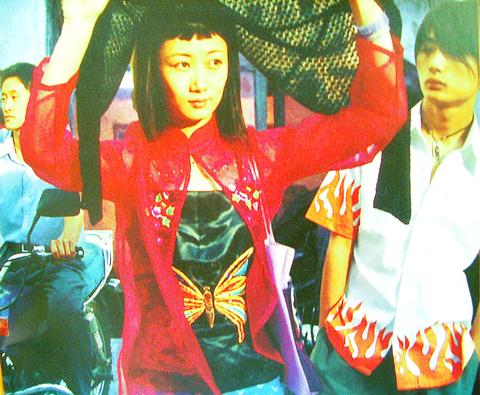Last year was very distinctive for both director Jia Zhangke (
"That year, reality was more theatrical than most films," said Jia, talking about his Cannes competition film Unknown Pleasure (任逍遙).

PHOTO COURTESY OF JIA ZHANKE
In the film, these actual events serve as the background for the stories of three aimless young characters in the remote provincial town of Tatung. A reflection on China in the wake of modernization, the subject matter is nothing new to Chinese films. But Jia, 32, offers a fresh and distinctive style. Using his camera to poetically observe people and reveal their humanity, his three most acclaimed works have made his talent recognized internationally. Unknown Pleasure, which was produced by a Chinese-Japanese team with Japanese, French and Korean financing, was the only Chinese-language film competing at this year's Cannes Festival.
The film project began as a documentary shooting in Tatung, Shanxi Province, Jai said. "At first it was the bleak and lonely buildings that attracted me. When I saw the streets filled with lonely, directionless people, I became interested in them," Jia said at a press conference last week.
According to Jia, because of Beijing's one-child population control policy, "they have no brothers and sisters, and often feel lonely."
Unknown Pleasure, pronounced "ren xiao yao" in Mandarin, tells a tale of solitude. Jobless slackers Xiao Ji (Wu Qiong,
"I was born in 1970 at the end of the Cultural Revolution when China was beginning to develop. But for the new generation, the development is nothing new. A new way of living and new values are available and have been spread fast by the media. Yet for a lot of people, the change in living conditions has been much slower than national development. This expanding gap created a lot of pressure ... on these young people," Jia said.
Having had previous films screen at both the Berlin Film Festival, (Xiao Wu, 1997) and the Venice Film Festival, (Platform, 2000), Jia this time makes a step forward to Cannes, competing for the Palm d'Or. But his film style remains the same.
Unknown Pleasure relies more on images than plot. Jia and cinematographer Yu Lik-wai (
"I have a particular preference for long takes because it allows you to feel time in the film," Jia said. "Other Chinese directors ... have explored a lot in cinematography. And I feel that time has not been explored," he said. "I like to gaze at ordinary people. By gazing for a long time, you don't need to ask what they're doing, what they've been through, you can feel that time is sculpting this person," he added.
Jia's perspective and film style is reminiscent of Taiwanese filmmaker Hou Hsiao-hsien (
"It is true that the spirit of his films has inspired me a lot," Jia said. He said his favorite of Hou's film is All the Youthful Days (
Challenging the status quo always involves risk. None of Jia's films have been permitted to screen in China, although pirated VCDs of all of them are widely available. "I am waiting. Time will solve this problem," Jia said casually.
He shouldn't worry. With international credentials and a ticket to Cannes, Jia will find audiences in Japan, France, Korea and, of course, Taiwan.

This is the year that the demographic crisis will begin to impact people’s lives. This will create pressures on treatment and hiring of foreigners. Regardless of whatever technological breakthroughs happen, the real value will come from digesting and productively applying existing technologies in new and creative ways. INTRODUCING BASIC SERVICES BREAKDOWNS At some point soon, we will begin to witness a breakdown in basic services. Initially, it will be limited and sporadic, but the frequency and newsworthiness of the incidents will only continue to accelerate dramatically in the coming years. Here in central Taiwan, many basic services are severely understaffed, and

Jan. 5 to Jan. 11 Of the more than 3,000km of sugar railway that once criss-crossed central and southern Taiwan, just 16.1km remain in operation today. By the time Dafydd Fell began photographing the network in earnest in 1994, it was already well past its heyday. The system had been significantly cut back, leaving behind abandoned stations, rusting rolling stock and crumbling facilities. This reduction continued during the five years of his documentation, adding urgency to his task. As passenger services had already ceased by then, Fell had to wait for the sugarcane harvest season each year, which typically ran from

It is a soulful folk song, filled with feeling and history: A love-stricken young man tells God about his hopes and dreams of happiness. Generations of Uighurs, the Turkic ethnic minority in China’s Xinjiang region, have played it at parties and weddings. But today, if they download it, play it or share it online, they risk ending up in prison. Besh pede, a popular Uighur folk ballad, is among dozens of Uighur-language songs that have been deemed “problematic” by Xinjiang authorities, according to a recording of a meeting held by police and other local officials in the historic city of Kashgar in

It’s a good thing that 2025 is over. Yes, I fully expect we will look back on the year with nostalgia, once we have experienced this year and 2027. Traditionally at New Years much discourse is devoted to discussing what happened the previous year. Let’s have a look at what didn’t happen. Many bad things did not happen. The People’s Republic of China (PRC) did not attack Taiwan. We didn’t have a massive, destructive earthquake or drought. We didn’t have a major human pandemic. No widespread unemployment or other destructive social events. Nothing serious was done about Taiwan’s swelling birth rate catastrophe.